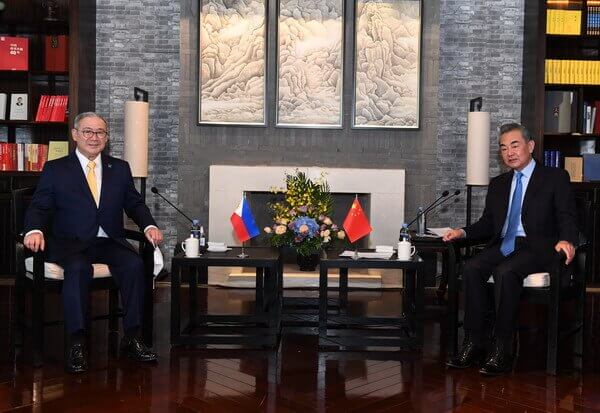Over the past week, Chinese State Councillor and Foreign Minister (FM) Wang Yi has held talks with the FMs of the Philippines, Panama, Canada, and Israel. Here’s a summary of their discussions:
Philippines
During his meeting with Philippines FM Teodoro Locsin in Tunxi on Sunday, Wang said that the two sides should “eliminate interference” and “calmly manage” their own differences, referring to their maritime dispute. He further stressed that China is ready to work with Manila to advance the construction of key infrastructure projects under the “Build, Build, Build” program and continue providing COVID-19 vaccine assistance to strengthen public health cooperation.
On the contentious subject of the South China Sea (SCS), Wang said that Beijing is ready to step up consultations on the Code of Conduct in the SCS and make joint efforts to maintain peace and cooperation. Locsin agreed to strengthen communication and make joint efforts. China and the Philippines have been at loggerheads over disputed areas in the SCS., particularly over the ownership of the uninhabited Spratly Islands and the Scarborough Shoal, which are strategically important to both countries. The areas have potentially significant and largely unexplored reserves of oil and natural gas. In addition, the region is productive for fishing and among the busiest areas of commercial shipping traffic. Both countries would get an extended continental shelf if their claims were recognised by the other.
In addition, Locsin also assured the Philippines’ support and participation in China’s Belt and Road Initiative (BRI).
Panama
On Monday, Wang met with Panamanian FM Erika Mouynes. Mouynes stressed her government’s adherence to the one-China principle Both sides agreed to consider restarting negotiations on their free trade agreement (FTA), deepen cooperation in the Colon Free Trade Zone, and strengthen cooperation in agriculture and grain.
They also exchanged views on the Ukraine war, in relation to which Mouynes said that the current geopolitical conflict “highlights the important value and strategic significance of the Panama Canal.” She also affirmed that Panama did not agree with the imposition of unilateral sanctions and stays committed to maintaining the permanent neutrality of the canal. Both agreed to jointly resist unilateralism and oppose “bullying practices.”
Chinese FM Wang Yi has urged Canada not to act as "the paws of the tiger" on behalf of the United States.
— lightening (@lighten70602163) April 6, 2022
In a phone call with his Canadian counterpart Melanie Joly, Wang said in recent years China-Canada relations had suffered a serious setback due to the Meng Wanzhou incident. pic.twitter.com/WmzrxAmgXn
Canada
On Tuesday, Wang held a phone conversation with Canadian FM Mélanie Joly. Wang said that the current level of bilateral relations is “not in the interests of both sides,” and in order to improve this, he put forth the following three-point proposal for Ottawa:
- View China positively and objectively and pursue a prudent and pragmatic China policy.
- Respect each other’s core interests, i.e. the one-China principle, and not set new obstacles to China-Canada relations.
- Uphold independence and eliminate unnecessary external interference.
Joly noted that Canada-China relations are at “a difficult phase” in recent years but assured the government’s readiness to work with Beijing in order to “bring Canada-China relations gradually back on the right track and build a more resilient bilateral relationship.”
On Apr 6, State Councilor & FM Wang Yi spoke with Israel's Alternate PM & FM Yair Lapid on the Phone.
— Chinese Embassy in Switzerland (@ChinaEmbinCH) April 7, 2022
-Understand & appreciate each other
-Free trade deal to be accelerated
-Exchanged views on the Palestinian issue/Ukrainian issue/Iranian nuclear issuehttps://t.co/fm00Aosd4H pic.twitter.com/YKmWOJjx2Z
Israel
On Wednesday, Wang had a phone conversation with Israel’s Alternate Prime Minister and FM Yair Lapid. Both sides agreed to speed up the negotiation and conclusion of their FTA and exchanged views on the Palestinian issue. With regard to the latter, Wang said that China is “glad to see Israel establish and develop normal and amicable relations with regional countries” and that the strategy “should be a part of the overall reconciliation in the Middle East.”
Wang added that the “prolonged impasse” in the Israel-Palestine peace talks is not beneficial to either party and that Palestine has “the legitimate right to establish an independent state.” Wang stressed that China supports the “two-state solution” and hopes that “the Arab and Jewish nations can coexist in harmony” and enhance common security. He also offered to facilitate direct negotiations between the two sides. Lapid assured Wang that Israel is committed to improving relations with Palestine.

